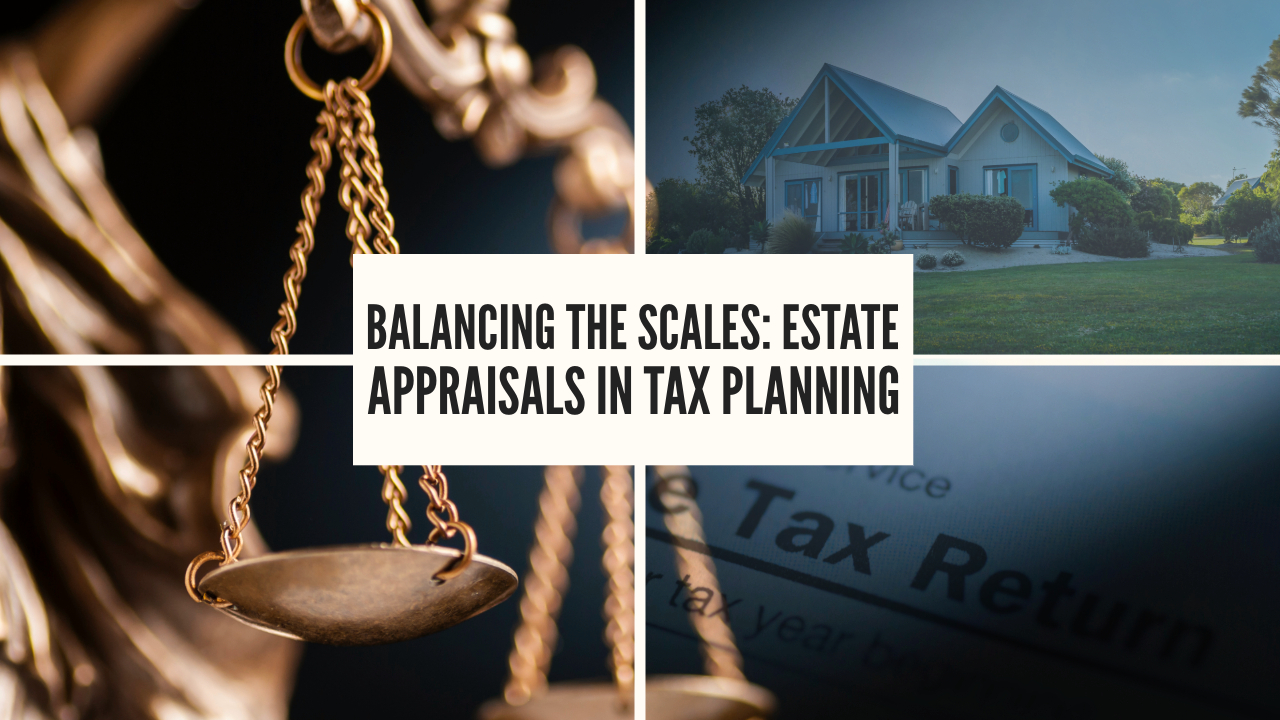Balancing the Scales: Estate Appraisals in Tax Planning
Balancing the Scales: Estate Appraisals in Tax Planning

Navigating the realm of estate appraisals and tax planning can be a daunting task. A solid understanding of estate appraisals can be the key to effective tax planning and ensuring your estate’s value is properly evaluated. This blog post will help you understand the significance of estate appraisals in tax planning, their role in the process, and how to utilize them efficiently.
Understanding Estate Appraisals and Their Importance
Estate appraisals form an integral part of the estate settlement and planning process, having wide-reaching implications on various aspects of the procedure. The primary function of estate appraisals involves estimating the value of an estate. This valuation process is a crucial step when an estate is being settled post the demise of the owner, to comply with the mandates of probate court, and to ensure fair distribution of assets among the beneficiaries.
However, the role of estate appraisals isn’t confined to merely settling an estate. They serve a crucial role in predicting potential tax liabilities during the estate planning stage. This foresight allows individuals to structure their estate strategically with the aim to limit the tax liabilities that could arise.
An accurate and reliable estate appraisal allows you to plan ahead, eliminating surprises down the line, particularly those associated with taxes. It equips you with the knowledge of the worth of your estate, and by extension, the potential tax liabilities you or your beneficiaries might face. This is particularly significant in the light of constantly changing tax laws and regulations. Therefore, understanding estate appraisals and their importance is key to informed estate planning and asset management.
The Role of Estate Appraisals in Tax Planning
Estate appraisals serve as a cornerstone in the process of tax planning, particularly in states such as Massachusetts and Connecticut where they carry significant weight. Complying with tax laws requires that the precise value of an estate be reported, forming the foundation on which potential estate tax liabilities are calculated. As such, a precise and comprehensive estate appraisal becomes a crucial aspect of a well-rounded tax strategy. It enables you to anticipate and prepare for any potential tax debts, ensuring that your beneficiaries are not blindsided by unexpected financial obligations. Furthermore, a thorough estate appraisal can provide a roadmap to effectively navigate the labyrinth of estate taxes, allowing for a more strategic approach to asset distribution and management. This process emphasizes the necessity of professional estate valuations, ensuring that the assessed value of an estate is both accurate and reliable. Therefore, the strategic role that estate appraisals play in tax planning cannot be underestimated.
The Impact of Estate Appraisals on Estate Taxes
The intricate relationship between estate appraisals and taxes is noteworthy. The value ascribed to an estate through appraisals directly influences the amount of estate taxes payable. In simpler terms, as the estate’s appraised value increases, so does the tax liability. Conversely, lower appraisals translate to less tax burden. However, caution should be exercised to avoid appraisals that may not accurately reflect the true value of the estate. Untrue or incorrect appraisals could land you in hot water with tax authorities, leading to financial penalties or legal disputes. For this reason, getting it right the first time is paramount. The goal should be to secure a professional and accurate appraisal that paints a true picture of the estate’s value. This not only ensures that the right amount of tax is paid, but it also steers clear of any potential disputes or disagreements with tax bodies. Consequently, the accuracy of estate appraisals directly impacts the tax planning process and reinforces the importance of professional, precise appraisals.
Beneficial Tax Strategies Tied to Estate Appraisals
Effectively leveraging estate appraisals in your tax planning process can potentially result in significant tax savings. Key strategies that may be utilized in this regard include making asset gifts during one’s lifetime, establishing trusts, and transitioning traditional retirement accounts to Roth accounts.
Making gifts of assets during your lifetime is a proven method of decreasing your taxable estate, thus reducing estate taxes. This strategy, however, depends heavily on accurate estate appraisals to determine the fair market value of the assets being gifted.
Establishing trusts is another strategy that can be employed to mitigate estate taxes. Trusts can provide a degree of control over your assets and their distribution, potentially sheltering them from estate taxes. The value of the assets transferred into a trust, determined through estate appraisals, directly influences the effectiveness of this strategy.
Transitioning traditional retirement accounts into Roth accounts is yet another tax-saving strategy tied to estate appraisals. A Roth conversion involves paying taxes upfront on the converted amount to avoid future income tax obligations for the beneficiaries. The converted amount’s tax liability is directly influenced by the value of your estate, as determined by professional estate valuations.
In each of these instances, the estate’s value, as determined through a precise and comprehensive estate appraisal, directly influences the effectiveness of the implemented tax strategy. Therefore, these strategies highlight the value of reliable and professional estate appraisals in the development and execution of tax-efficient estate planning.
Estate Appraisals and Tax Planning: Staying Updated
In the ever-evolving landscape of tax regulations, continuous engagement with estate appraisals becomes a strategic necessity. The process of estate appraisals and tax planning should not be a one-time affair, but rather an ongoing activity. With fluctuating property values and dynamic market conditions, periodic updates to your estate appraisal can offer a real-time snapshot of your estate’s value. This not only facilitates a more robust understanding of your potential tax liability, but also offers an opportunity to refine your tax strategy accordingly.
Staying informed about changes in tax laws and adjustments in asset values is critical. As such, revaluation of your estate should be planned at regular intervals, or in response to significant market shifts. Regular updates can help you keep pace with the ever-changing tax landscape and facilitate strategic decisions about asset management, distribution or gifting, and retirement account transitions.
However, keeping abreast of the latest changes in tax laws and estate value changes can be a challenging task. This is where the role of professional estate appraisers becomes even more significant. They not only provide accurate valuations of your estate, but they can also help you navigate the complexities of tax planning in light of current laws and regulations. By doing so, they assist in creating an adaptive and tax-efficient estate plan that resonates with your financial objectives.
Therefore, integrating periodic estate appraisals into your tax planning process becomes a strategic necessity in navigating the shifting tides of tax laws and estate values. With regular updates, your tax strategy can evolve with the changing circumstances, offering a dynamic approach to estate tax planning.
Why A Professional Just Makes Sense
The complexities of estate appraisals and tax planning cannot be overstated. It requires a deep understanding of not only the valuation process, but also tax laws and how these laws interact with an estate’s value. It is here that the expertise of a professional estate appraiser becomes vital. A professional provides a clear, accurate, and comprehensive evaluation of your estate. Their specialized knowledge in property valuation ensures that the true worth of your estate is determined, which is critical in forming a robust tax strategy.
Additionally, a professional estate appraiser is well-versed in the intricacies of tax planning. They can guide you through the maze of tax laws, ensuring your estate strategy aligns with current regulations. This informed guidance can be invaluable in minimizing tax liabilities and ensuring a smoother transition of assets to beneficiaries.
A professional also brings to the table a wealth of experience. Their expertise in handling estates similar to yours means they can help tailor your tax strategy to your specific circumstances, often unearthing opportunities for tax savings you may not have considered. Moreover, the peace of mind that comes with knowing a professional is overseeing your estate appraisal and tax planning is immeasurable.
While you may feel capable of handling your estate appraisals and tax planning, it’s worth considering the potential consequences of an oversight or mistake. The risk of penalties, legal disputes, and financial burdens can be significant. A professional estate appraiser minimizes these risks, providing you with an accurate assessment and strategic tax planning that stands up to scrutiny.
In conclusion, securing professional assistance for your estate appraisals just makes sense. It provides an accurate picture of your estate’s value, and helps you to navigate the complexities of tax planning. By engaging a professional, you can ensure a more accurate, efficient, and strategic approach to managing your estate. Give us a call today to learn more.

